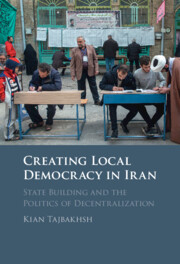Book contents
- Creating Local Democracy in Iran
- Creating Local Democracy in Iran
- Copyright page
- Contents
- Figures
- Tables
- Preface: Stumbling on Local Democracy (My Personal Journey)
- Acknowledgments
- Overview of the Book
- Abbreviations
- Part I Launching Local Democracy
- Part II Arguing for Local Democracy
- Part III Blocking Local Democracy
- 6 The Rocky Path from Elections to Democracy
- 7 City Planning and the Challenges of Democratic Governance
- 8 Financing Local Democracy
- 9 Geopolitics and the Limits of International Municipal Cooperation
- 10 What of the Future of Local Democracy?
- Index
10 - What of the Future of Local Democracy?
from Part III - Blocking Local Democracy
Published online by Cambridge University Press: 07 July 2022
- Creating Local Democracy in Iran
- Creating Local Democracy in Iran
- Copyright page
- Contents
- Figures
- Tables
- Preface: Stumbling on Local Democracy (My Personal Journey)
- Acknowledgments
- Overview of the Book
- Abbreviations
- Part I Launching Local Democracy
- Part II Arguing for Local Democracy
- Part III Blocking Local Democracy
- 6 The Rocky Path from Elections to Democracy
- 7 City Planning and the Challenges of Democratic Governance
- 8 Financing Local Democracy
- 9 Geopolitics and the Limits of International Municipal Cooperation
- 10 What of the Future of Local Democracy?
- Index
Summary
Chapter 10 situates the findings of the book in the main lines of literature on Iran state-building: state centralization and its contradictions; authoritarian persistence; social welfare compact between state and citizens; and the challenges of democratization. The chapter also assesses the implications of the Iran experience for conventional expectations of the democracy-decentralization nexus. The chapter explains why the main lines of literature on modern Iranian state-building fail to explain what motivated the IRI to adopt political decentralization or to explain the timing when it finally did so. Nor does this scholarship distinguish the two dimensions of centralization emphasized in this book. Moreover, scholarship on Iranian state-building has thus far not engaged with the theory of electoral authoritarianism; my findings give strong support to this theory, which explains how the regime effectively deploys local electoral politics to enhance its dominance. Electoral authoritarianism moreover explains how the two forms of state power – the despotic and infrastructural – can be combined in the management of subnational divisions of the nation’s territory. Finally, the findings of the book undermine the claim, associated with writers such as Mahmoud Taleghani or Alexis de Tocqueville, that there is an necessary and causal relationship between decentralization and democratization. The book shows how political and electoral decentralization can be compatible with authoritarian state-building.
Keywords
- Type
- Chapter
- Information
- Creating Local Democracy in IranState Building and the Politics of Decentralization, pp. 286 - 299Publisher: Cambridge University PressPrint publication year: 2022

